TUE NONE
Page 42
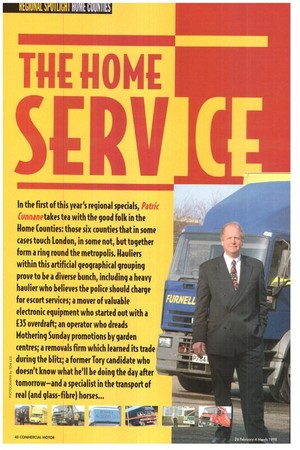
Page 43
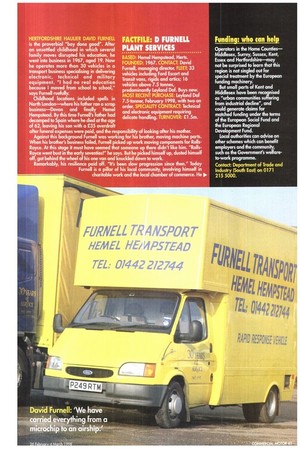
Page 44
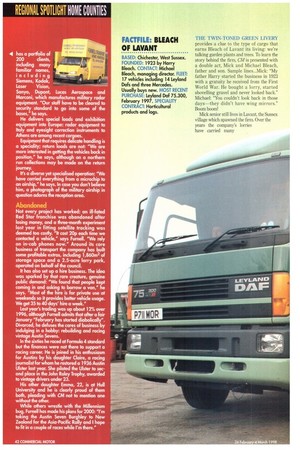
Page 45
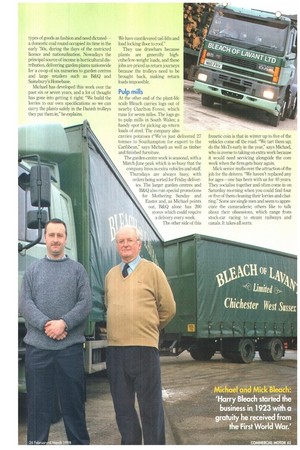
Page 46
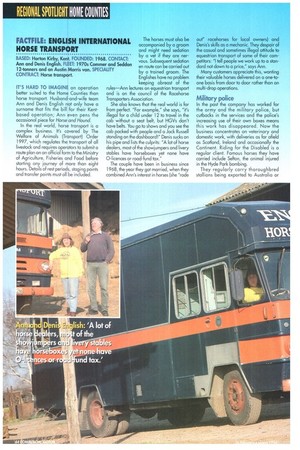
Page 47
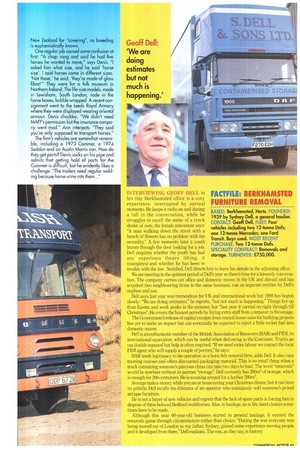
Page 48
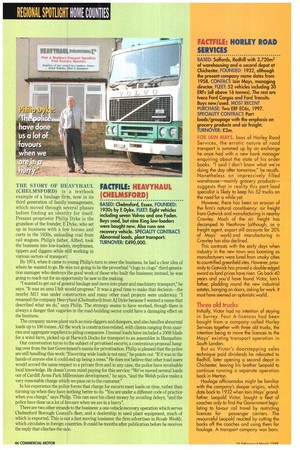
Page 49
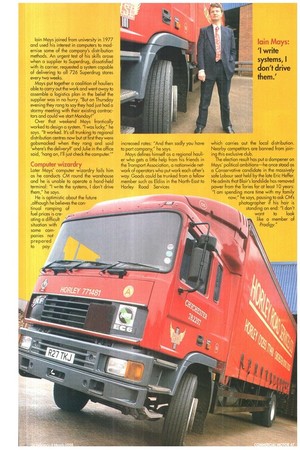
If you've noticed an error in this article please click here to report it so we can fix it.
In the first of this year's regional specials, Patric Cunnanetakes tea with the good folk in the Home Counties: those six counties that in some cases touch London, in some not, but together form a ring round the metropolis. Hauliers within this artificial geographical grouping prove to be a diverse bunch, including a heavy haulier who believes the police should charge for escort services; a mover of valuable electronic equipment who started out with a 135 overdraft; an operator who dreads Mothering Sunday promotions by garden centres; a removals firm which learned its trade during the blitz; a former Tory candidate who doesn't know what he'll be doing the day after tomorrow—and a specialist in the transport of real (and glass-fibre) horses...
HERTFORDSHIRE HAULIER DAVID FURNELL is the proverbial "boy done good". After an unsettled childhood in which several family moves disrupted his education, he went into business in 1967, aged 19. Now he operates more than 30 vehicles in a transport business specialising in delivering electronic, technical and military equipment. "I had no real education because I moved from school to school," says Furnell ruefully.
Childhood locations included spells in North London—where his father ran a scrap business—Devon and finally Hemel Hempstead. By this time Fumell's father had decamped to Spain where he died at the age of 62, leaving his son with a .£35 overdraft after funeral expenses were paid, and the responsibility of looking after his mother. Against this background Furnell was working for his brother, moving machine parts. When his brother's business failed, FumeII picked up work moving components for Rolls Royce. At this stage it must have seemed that someone up there didn't like him. "RollsRoyce went bust in the early seventies!" he says. But he picked himself up, dusted himself off, got behind the wheel of his one van and knuckled down to work. Remarkably, his resilience paid off. "It's been slow progression since then." Today Furnell is a pillar of his local community, involving himself in charitable work and the local chamber of commerce. He Is 41I has a portfolio of 200 clients, including many familiar names, including Siemens, Kodak, Laser Vision, Sanyo, Dupont, Lucas Aerospace and Marconi, which manufactures military radar equipment. "Our staff have to be cleared to security standard to go into some of the bases," he says. He delivers special loads and exhibition equipment into Europe: radar equipment to Italy and eyesight correction instruments to Athens are among recent cargoes. Equipment that requires delicate handling is a speciality; return loads are not: "We are more interested in getting the vehicles back in position," he says, although on a northern run collections may be made on the return journey.
It's a diverse yet specialised operation: "We have carried everything from a microchip to an airship," he says. In case you don't believe him, a photograph of the military airship in question adorns the reception area.
Abandoned
Not every project has worked: an ill-fated Red Star franchise was abandoned after losing money, and a three-month experiment last year in fitting satellite tracking was deemed too costly. "It cost 20p each time we contacted a vehicle," says Furnell. "We rely on in-cab phones now." Around its core business of transport the company has built some profitable extras, including 1,860m2 of storage space and a 2.5-acre lorry park, operated on behalf of the council.
It has also set up a hire business. The idea was sparked by that rare creature, genuine public demand: "We found that people kept coming in and asking to borrow a van," he says. "Most of the hire is for private use at weekends so it provides better vehicle usage. We get 35 to 40 days' hire a week."
Last year's trading was up about 12% over 1996, although Furnell admits that after a fair January "February has started diabolically". Divorced, he defuses the cares of business by indulging in a hobby: rebuilding and racing vintage Austin Sevens.
In the sixties he raced at Formula 4 standard but the finances were not there to support a racing career. He is joined in his enthusiasm for Austins by his daughter Claire, a racing journalist for whom he restored a 1936 Austin Ulster last year. She piloted the Ulster to second place in the John Roley Trophy, awarded to vintage drivers under 23.
His other daughter Emma, 22, is at Hull University and he is clearly proud of them both, pleading with CM not to mention one without the other.
While others wrestle with the Millennium bug, Furnell has made his plans for 2000: "I'm taking the Austin Seven Burghley to New Zealand for the Asia-Pacific Rally and I hope to fit in a couple of races while I'm there."
FACTFILE: D FURNELL PLANT SERVICES BASED: Hemel Hempstead, Herts. FOUNDED: 1967. CONTACT: David Furnell, managing director. FLEET: 33 vehicles including Ford Escort and Transit vans, rigids and arks; 16 vehicles above 7.5 tonnes, predominantly Leyland Daf. Buys new. MOST RECENT PURCHASE: Leyland Daf 7.5-tanner, February 1998, with two on order. SPECIALITY CONTRACT: Technical and electronic equipment requiring delicate handling. TURNOVER: Cl .5m.
Funding: who can help
Operators in the Home Counties— Middlesex, Surrey, Sussex, Kent, Essex and Hertfordshire—may not be surprised to learn that this region is not singled out for special treatment by the European funding machinery. But small parts of Kent and Middlesex have been recognised as "urban communities suffering from industrial decline", and could generate claims for matched funding under the terms of the European Social Fund and the European Regional Development Fund. Local authorities can advise on other schemes which can benefit employers and the community, such as the Government's welfareto-work programme.
Contact: Department of Trade and Industry (South East} on 0171 215 5000.
FACTFILE: BLEACH OF LAVANT BASED: Chichester, West Sussex. FOUNDED: 1923 by Harry Bleach. CONTACT: Michael Bleach, managing director. FLEET 17 vehicles including 14 Leyland Dafs and three Mercedes. Usually buys new. MOST RECENT PURCHASE: Leyland Daf 75.300, February 1997. SPECIAUTY CONTRACT: Horticultural products and logs. THE TWIN-TONED GREEN LIVERY provides a clue to the type of cargo that earns Bleach of Lavant its living: we're talking garden plants and trees. To learn the story behind the firm, CM is presented with a double act, Mick and Michael Bleach, father and son. Sample lines. ..Mick: "My father Harry started the business in 1923 with a gratuity he received from the First World War. He bought a lorry, started shovelling gravel and never looked back." Michael: "You couldn't look back in those days—they didn't have wing mirrors." Boom boom!
Mick senior still lives in Lavant, the Sussex village which spawned the firm_ Over the years the company's lorries have carried many types of goods as fashion and need dictated— a domestic coal round occupied its time in the early '50s, during the days of the restricted licence and nationalisation. Nowadays the principal source of income is horticultural distribution, delivering garden plants nationwide for a co-op of six nurseries to garden centres and large retailers such as B&Q and Sainsbury's Homebase.
Michael has developed this work over the past six or seven years, and a lot of thought has gone into getting it right: "We build the lorries to our own specifications so we can carry the plants safely in the Danish trolleys they put them in," he explains. We have cantilevered tail-lifts and load locking floor to roof."
They use drawbars because plants are generally highcube/low-weight loads, and these jobs are priced as return journeys because the trolleys need to be brought back, making return loads impossible.
Pulp mills
At the other end of the plant-life scale Bleach carries logs out of nearby Charlton Forest, which runs for seven miles. The logs go to pulp mills in South Wales; a handy spot for picking up return loads of steel. The company also carries potatoes ("We've just delivered 27 tonnes to Southampton for export to the Caribbean," says Michael) as well as timber and finished furniture.
The garden-centre work is seasonal, with a March-June peak which is so busy that the company hires in extra vehicles and staff. Thursdays are always busy, with orders being sorted for Friday deliveries. The larger garden centres and BM) also run special promotions for Mothering Sunday and Easter and, as Michael points out, B&Q alone has 200 stores which could require a delivery every week. The other side of this frenetic coin is that in winter up to five of the vehicles come off the road. "We tart them up; do the MoTs early in the year." says Michael, who is averse to taking on extra work because it would need servicing alongside the core work when the firm gets busy again.
Mick senior mulls over the attraction of the job for the drivers: "We haven't replaced any for ages—one has been with us for 40 years. They socialise together and often come in on Saturday morning when you could find four or five of them cleaning their lorries and chatting." Some are single men and seem to appreciate the camaraderie; others like to talk about their obsessions, which range from stock-car racing to steam railways and canals. It takes all sorts.
BASED: Horton Kirby, Kent. FOUNDED: 1968. CONTACT: Ann and Denis English. FLEET: 1970s Commer and Seddon 12-tonners and an Austin Morris van. SPECIALITY CONTRACT: Horse transport.
IT'S HARD TO IMAGINE an operation better suited to the Home Counties than horse transport. Husband-and-wife team Ann and Denis English not only have a surname that fits the bill for their Kentbased operation; Ann even pens the occasional piece for Horse and Hound.
In the real world, horse transport is a complex business. It's covered by The Welfare of Animals (Transport) Order 1997, which regulates the transport of all livestock and requires operators to submit a route plan on an official form to the Ministry of Agriculture, Fisheries and Food before starting any journey of more than eight hours. Details of rest periods, staging points and transfer points must all be included. The horses must also be accompanied by a groom and might need sedation by a vet if they are nervous. Subsequent sedation en route can be carried out by a trained groom. The Englishes have no problem keeping abreast of the rules—Ann lectures on equestrian transport and is on the council of the Racehorse Transporters Association. She also knows that the real world is far from perfect. "For example," she says, "it's illegal for a child under 12 to travel in the cab without a seat belt, but HGVs don't have belts. You go to shows and you see the cab packed with people and a Jack Russell standing on the dashboard!" Denis sucks on his pipe and lists the culprits' "A lot of horse dealers, most of the showjumpers and livery stables have horseboxes yet none have 0-licences or road-fund tax."
The couple have been in business since 1968, the year they got married, when they combined Ann's interest in horses (she "rode out" racehorses for local owners) and Denis's skills as a mechanic. They despair of the casual and sometimes illegal attitude to equestrian transport of some of their competitors: "I tell people we work up to a standard not down to a price," says Ann.
Many customers appreciate this, wanting their valuable horses delivered on a one-toone basis from door to door rather than on multi-drop operations.
Military police
In the past the company has worked for the army and the military police, but cutbacks in the services and the police's increasing use of their own boxes means this work has disappeared. Now the business concentrates on veterinary and domestic work, with deliveries as far afield as Scotland, Ireland and occasionally the Continent. Riding for the Disabled is a regular client. Famous horses they have carried include Sefton, the animal injured in the Hyde Park bombing. They regularly carry thoroughbred stallions being exported to Australia or New Zealand for "covering", as breeding is euphemistically known.
One regular job caused some confusion at first: "A chap rang and said he had five horses he wanted to move," says Denis. "I asked him what size, and he said 'horse size'. I said horses come in different sizes. 'Not these,' he said, 'they're made of glass fibre!" They were for a folk museum in Northern Ireland. The life-size models, made in Lewisham, South London, rode in the horse boxes, bubble wrapped. A recent consignment went to the Leeds Royal Armory where they were displayed wearing oriental armour. Denis chuckles: "We didn't need MAFF's permission but the insurance company went mad." Ann interjects: 'They said you're only supposed to transport horses." The firm's vehicles are somewhat venerable, including a 1973 Commer, a 1974 Seddon and an Austin Morris van. How do they get parts? Denis sucks on his pipe and admits that getting hold of parts for the Commer is difficult, but he evidently likes a challenge: "The trailers need regular welding because horse urine rots them..." INTERVIEWING GEOFF DELL in his tiny Berkhamsted office is a cosy experience, interrupted by surreal moments. He keeps a radio on and during a lull in the conversation, while he struggles to recall the name of a truck dealer of yore, the female announcer says: "A man walking down the street with a bunch of flowers has no problem with his sexuality." A few moments later a youth bursts through the door looking for a job. Dell enquires whether the youth has had any experience (heavy lifting, it transpires) and whether he has been in trouble with the law. Satisfied, Dell directs him to leave his details in the adjoining office.
We are meeting in the quietest period of Dell's year so there's time for a leisurely conversation. The company carries out office and domestic moves in the UK and abroad and has acquired two neighbouring firms in the same business, run as separate entities by Dell's nephew and son.
Dell says last year was tremendous for UK and international work but 1998 has begun slowly: "We are doing estimates," he reports, "but not much is happening." Things hot up from Easter, and work peaks in the summer, but "last year it carried on right through till Christmas". He covers the busiest periods by hiring extra staff from a remover in Stevenage.
The Government's release of capital receipts from council house sales for building projects has yet to make an impact but can eventually be expected to inject a little rocket the] into domestic moves.
Dell is an enthusiastic member of the British Association of Removers (BAR) and FLDI, its international equivalent, which can be useful when delivering to the Continent. Trucks go out double-manned but help is often required: "If we need extra labour we contact the local FIDI agent who will supply a couple of porters," he says.
BAR lends legitimacy to his operation as a bona fide removal firm, adds Dell. It also runs training courses and offers discounted packaging material, This is no small thing when a truck containing someone's precious china can take two days to load. The word "removals" would be nowhere without its partner ''storage": Dell currently has 280m2 of storage, which is enough for 200 containers. He is scouting around for a further 280m2.
Storage makes money while you are at home eating your Christmas dinner, but it can have its pitfalls: Dell recalls the dilemma of an operator who mistakenly sold someone's prized antique furniture.
He is not a buyer of new vehicles and regrets that the lack of spare parts is forcing him to dispose of three beloved Bedford workhorses. Alas, in haulage, as in life, hard choices sometimes have to be made.
Although this near 60-year-old business started in general haulage, it entered the removals game through circumstances rather than choice. "During the war everyone was being moved out of London so my father, Sydney, gained some experience moving people and it developed from there," Dell explains. The rest, as they say, is history FACTFILE: BERKNAMSTED FURNITURE REMOVAL BASED: Berkhamsted, Herts. FOUNDED: 1939 by Sydney Dell, a general haulier. CONTACT: Geoff Dell. FLEET: Four vehicles including two 12-tonne Dafs; one 12-tonne Mercedes; one Ford Transit. Buys used. MOST RECENT PURCHASE: Two 12-tonne Dafs. SPECIAUTY CONTRACT: Removals and storage. TURNOVER: £750,000. FACTFILE: HEAVYHAUL (CHELMSFORD) BASED: Chelmsford, Essex. FOUNDED: 1930s by E Dyke. FLEET: Eight vehicles including seven Volvos and one Foden. Buys used, but nine King low-loaders were bought new. Also runs one recovery vehicle. SPECIALTY CONTRACT; Abnormal loads, plant transport. TURNOVER: £490,000. THE STORY OF HEAVYHAUL (CHELMSFORD) is a textbook example of a haulage firm, now in its third generation of family management, which moved through several phases before finding an identity for itself.
Present proprietor Philip Dyke is the grandson of the founder, E Dyke, who set up in business with a few horses and carts in the 1930s, unloading coal from rail wagons. Philip's father, Alfred, took the business into low-loaders, stepframes, tippers and diggers while still working in various sectors of transport.
By 1974, when it came to young Philip's turn to steer the business, he had a clear idea of where he wanted to go. He was not going to be the proverbial "clogs to clogs" third-generation manager who destroys the good work of those who built the business; instead, he was going to reach out for an opportunity he saw in the making.
"1 wanted to get out of general haulage and move into plant and machinery transport," he says. "It was an area I felt would progress." It was a good time to make that decision—the nearby M11 was under construction and many other road projects were underway. "I renamed the company Heavyhaul (Chelmsford) from AJ Dyke because I wanted a name that described what we do," says Philip. The strategy seems to have worked, though there is always a danger that vagaries in the road-building sector could have a damaging effect on the business.
The company moves plant such as mini-diggers and dumpers, and also handles abnormal loads up to 100 tonnes. All the work is construction-related, with clients ranging from quarries and aggregate suppliers to piling companies. Unusual loads have included a 100ft blade for a wind farm, picked up at Harwich Docks for transport to an assembler in Hampshire.
Our conversation turns to the subject of privatised escorts; a contentious proposal hanging over from the last Government's mania for privatisation. Philip is pleased that the police are still handling this work: "Escorting wide loads is not easy," he points out. "11 it was in the hands of anyone else it could end up being a mess." He does not believe that other road users would accord the same respect to a private firm and in any case, the police have invaluable local knowledge. He doesn't even mind paying for this service: "We've moved several loads out of Cardiff Arms Park Millennium development," he says, "and the Welsh police make a very reasonable charge which we pass on to the customer."
In his experience the police forces that charge for escorts meet loads on time, rather than turning up when they have nothing better to do. "You are under a different code of practice when you charge," says Philip. This can save his client money by avoiding delays, "and the police have done us a lot of favours when we are in a hurry".
There are two other strands to the business: a one-vehicle recovery operation which serves Chelmsford Borough Council's fleet, and a dealership in used plant equipment, much of which is exported. This is not a fast moving business: the firm advertises in Resale Weekly, which circulates in foreign countries. It could be months after publication before he receives the reply that clinches the sale. FACTFILE: HORLEY ROAD SERVICES BASED: Sa!fords, Redhill with 3,720m2 of warehousing and a second depot at Chichester. FOUNDED: 1932, although the present company name dates from 1958. CONTACT: lain Mays, managing director. FLEET: 52 vehicles including 30 ERFs (all above 16 tonnes). The rest are lveco Ford Cargos and Ford Transits. Buys new/used. MOST RECENT PURCHASE: Two ERF EC6s, 1997. SPECIALITY CONTRACT: Part loads/groupage with the emphasis on grocery products and air freight. TURNOVER: £3m.
FOR 1A1N M boss of Honey Road Services, the erratic nature of road transport is summed up by an exchange he once had with a new bank manager enquiring about the state of his order books. "I said I don't know what we're doing the day after tomorrow," he recalls. Nonetheless an impressively filled warehouse—mainly grocery products— suggests that in reality this part-load specialist is likely to keep his 52 trucks on the road for a while yet.
However, there has been an erosion of the firm's natural constituency: air freight from Gatwick and manufacturing in nearby Crawley. Much of the air freight has decamped to Heathrow (although, as a freight agent, export still accounts for 20% of Mays' work) and manufacturing in Crawley has also declined. This contrasts with the early days when industry in the new town was booming as manufacturers were lured from smoky cities to countrified greenfield sites. However, proximity to Gatwick has proved a double-edged sword as land prices have risen. Go back 40 years and you'd have found Victor, lain's Father, plodding round the new industrial estates, banging on doors, asking for work. It must have seemed an optimistic world.
Three old trucks Initially, Victor had no intention of staying in Surrey. Four A-licences had been bought from a company called Horley Services together with three old trucks, the intention being to move the licences to the Mays' existing transport operation in South London.
But as Victor's doorstepping sales technique paid dividends he relocated to Redhill, later opening a second depot in Chichester, leaving his brother Leopold to continue running a separate operation back in Merton.
Haulage afficionados might be familiar with the company's deeper origins, which date back to 1932 when lain Mays' grandfather, Leopold Victor, bought a fleet of coaches only to find the Government legislating to favour rail travel by restricting licences for passenger carriers. The resourceful Leopold reacted by cutting the backs off the coaches and using them for haulage. A transport company was born. loin Mays joined from university in 1977 and used his interest in computers to modernise some of the company's distribution methods. An urgent test of his skills arose when a supplier to Superdrug, dissatisfied with its carrier, requested a system capable of delivering to all 726 Superdrug stores every two weeks.
Mays put together a coalition of hauliers able to carry out the work and went away to assemble a logistics plan in the belief the supplier was in no hurry. "But on Thursday evening they rang to say they had just had a stormy meeting with their existing contractors and could we start Monday!" Over that weekend Mays frantically worked to design a system. "I was lucky," he says. "It worked. It's all trunking to regional distribution centres now but at first they were gobsmacked when they rang and said 'where's the delivery? and Julie in the office said, 'hang on, I'll just check the computer!"
Computer wizardry




















































































































